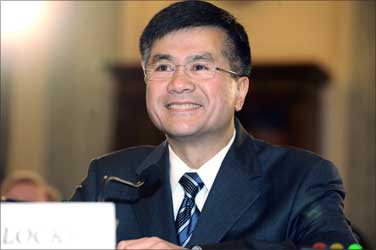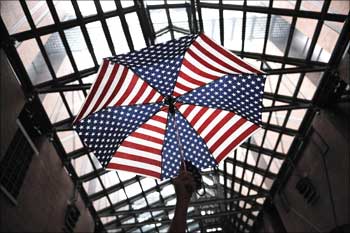Photographs: Reuters Aziz Haniffa in Washington DC
The Obama administration, responding to India's angst over the sharp hike in H-1B and L1 visa fees as discriminatory and anti-trade in services, has argued that India is equally discriminatory.
The United States, in its attempt to absolve itself of the legislation signed by President Obama, saying it was pushed through by the US Congress as a means to raise revenue for border protection.
US Commerce Secretary Gary Locke, said this at a media roundtable in Washington on the eve of his departure on a weeklong trip to India, leading a high tech trade delegation.
When asked how much of an irritant to US-India trade this visa hike would have and if this was counterproductive when the US was trying to boost exports to India to restrict India exports to the US in terms of services, Locke said, "Actually we have to look at the overall picture, because the United States is still one of the most open economies in the world."
. . .
India is discriminatory; must open up economy: US
Image: US President Barack Obama with his team during a meeting with Prime Minister Manmohan Singh.Photographs: Reuters
He argued that "there is a lot of businesses and sectors in India that are operating in the United States even though some of these same sectors are closed off to American participation in India -- whether it's legal services and the like."
Locke acknowledged, however, that "there has also been growing Indian investment in the United States as President Obama indicated (during his visit to India in November)."
India needs to open up its economy through steps such as reducing tariff and non-tariff barriers, lifting restrictions on foreign direct investment (FDI) and improving the protection of intellectual property, Locke said.
Noting that India faces huge developmental challenges -- ranging from upgrading infrastructure to medical devices, to energy and upliftment of the quality and standard of life of its people -- Locke said this is where American companies can facilitate the Indian government's objectives.
. . .
India is discriminatory; must open up economy: US
Photographs: Reuters
"But to take advantage of these opportunities, India itself would have to take further steps to open up its economy, including reducing a variety of tariff and non-tariff barriers, lifting restrictions on foreign direct investment and improving the protection of intellectual property," Locke said.
Observing that concerns that the US and other international businesses have with respect to India's business environment need to be resolved, he noted, however, there was no quick procedure.
"But we aim to start that process through the trade mission next week," he said, adding that the United States has not given up on market access issues with India.
"We believe it is in the economic interest of the Indian people to open up this economy. People in both countries would benefit from that," Locke observed, adding that the Obama Administration is pushing for mutually beneficial trade.
. . .
India is discriminatory; must open up economy: US
Photographs: Reuters
"No doubt that India is moving in the right direction and will be able to work through a lot of these issues. When you look at the last 20 years, India has opened its economy and come further and faster than anyone ever could have predicted," he said.
Locke argued that expanding US exports to India represent the kind of mutually beneficial trade that creates jobs in both India and the US and will help improve the quality of life for the people of India.
"This is really a win-win opportunity for the people and businesses of both the countries," Locke said.
The US commerce secretary said that this controversial visa hike issue "has been raised by numerous Indian government officials and was never you've got some of the sponsors of the legislation it was viewed the ultimate objective of that legislation was to raise revenues to pay for our border protection problems -- our northern and southern borders -- and that was a vehicle by which the Congress was able to latch on to."
. . .
India is discriminatory; must open up economy: US
Photographs: Reuters
"But we are understanding of the concerns that the Indian government has raised about what it (the legislation) says," he reiterated.
When asked how he was going to address this issue when he speaks to leading Indian industry bodies that have criticised the visa fee hikes, Locke said, "It was unfortunate that that was the vehicle that was chosen to finance some of these measures for enhanced border security."
"We need to work with the Congress to find ways in which we can raise the same amount of dollars," he said. "We need to have that discussion with the Congress."
But when pressed if the administration was trying to alleviate India's concerns and dismantle these steep fees which many in India believe is in violation of even World Trade Organization guidelines regarding international trade in services, Locke said, "I don't believe the administration has come up with a proposal though it's not for me to comment on what the future might hold."
. . .
India is discriminatory; must open up economy: US
Photographs: Reuters
Last August Obama signed this legislation into law, where companies with less than 50 per cent of American workers have to pay an additional $2,000 on H1-B and L1 visas, which was nearly double the earlier fees.
Currently, H1B visas costs range between $2,000 and $5,000 depending on the attorney and premium processing fees.
During the run-up to the vote on this bill, Senator Charles Schumer, New York Democrat, a long-time beneficiary of Indian American contributions to his campaign coffers and a close friend of noted Indian American hotelier and Padma Bushan awardee Sant Singh Chatwal, who co-sponsored the legislation with Missouri Democrat Claire McCaskill, raised the ire of New Delhi when he disparaged one of the most venerable Indian American companies Infosys, calling it a 'chop-shop.'
Schumer, said, "The emergency border funds would be paid for by assessing fees on foreign companies known as chop-shops. These were companies that outsourced good, high-paying American technology jobs to lower wage, temporary immigrant workers from other countries. Companies such as Infosys; but it will not affect high-tech companies such as Intel or Microsoft that play by the rules and recruit workers in America."








article